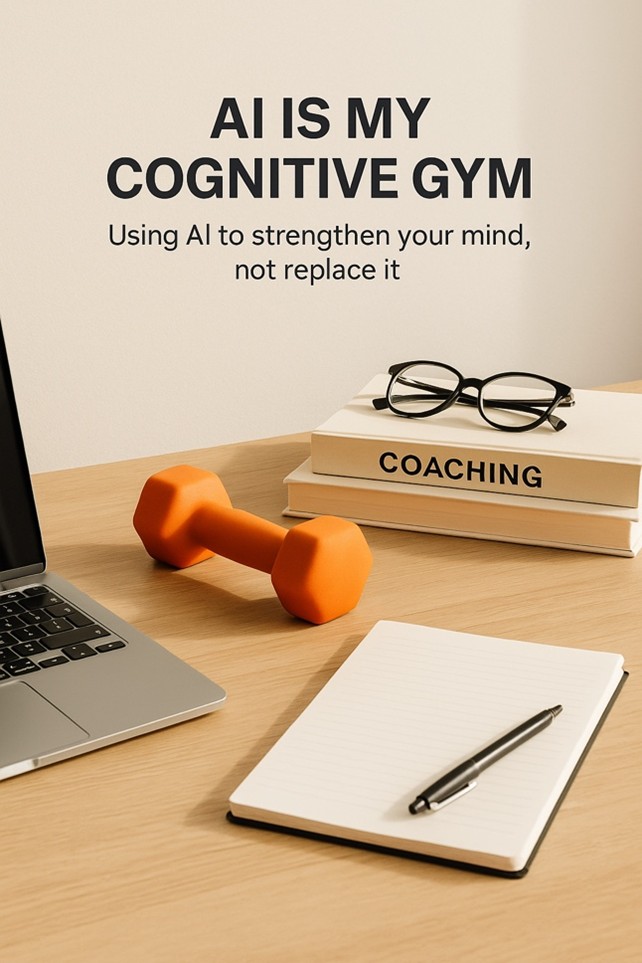About Us / Resources / Articles
AI Is My Cognitive Gym
About Us / Resources / Articles
AI Is My Cognitive Gym
How to Strengthen, Not Weaken, Your Mind🧠💪
By Arline Davis, "Artificial Intelligence Master Trainer, AITI" By Arline Davis, Master Trainer AITI
“The difference isn’t AI itself — it’s how you use it.”

🚨 The Study That Sparked the Conversation
A recent study — Your Brain on ChatGPT: Accumulation of Cognitive Debt when Using an AI Assistant for Essay Writing Task (arXiv, 2025) — found that when participants used AI for essay writing, they often accumulated what the researchers called cognitive debt.
In simple terms: they relied on AI’s output without fully processing or internalizing it, which could hinder deeper learning.
Important context: This research was conducted specifically in the setting of essay writing. Other uses of AI — particularly interactive, exploratory, and cognitively demanding ones — can have the opposite effect.
📈 Evidence AI Can Boost Cognitive Health
Research Highlights
📊 Journal of Medical Internet Research: People
aged 45+ who actively use the internet have a lower risk of cognitive
decline.
📊 Washington Post: For those with an average age
of 69, active engagement with digital technology can reduce cognitive
impairment risk by up to 58%.
I’m living proof of this effect — but not by accident. AI helps me take intuitive bursts — rapid, interconnected ideas — and transform them into applicable clarity. It’s the mental discipline of naming what’s there and refining it into something I can apply and tes.
🏢 The Overlooked Advantage of Experienced Power Users
Recent insights from Harvard Business Review — How Ageism Is Undermining AI Implementation — point out that many organizations ignore a hidden asset: experienced “power users” aged 60+.
These professionals often combine:
- Strategic insight gained from decades of decision-making
- Critical thinking sharpened over complex, high-stakes situations
- Deep contextual knowledge of their industry and organization
When such expertise meets active, intentional AI use, it creates a powerful advantage in AI adoption and implementation. Far from being a barrier, these seasoned power users can accelerate AI success — provided they are invited to participate and given the right tools.
This resonates deeply with my own journey: as a 60+ professional, I don’t just use AI passively — I make it an amplifier for my expertise.
1) I Demand More of Myself Than of AI — But I Make AI Work Hard Too
I never use AI to bypass thinking. Instead, I give it complex challenges — challenges I can audit and monitor because they’re based on psychological models I’ve studied in depth.
Example: I integrated four distinct psychological transition models — each one a subject of my own intensive study — into a single client map. AI cross-referenced data quickly, but the synthesis and critical evaluation were entirely mine.
2️) I Train My Mental Flexibility
Switching between models, perspectives, and symbols is part of my daily mental workout. AI supports this when used for variety — not for repeating the same patterns.
3️) I Put My Working Memory to Work
Working with AI is like running my brain’s RAM at full power.
I reverse-engineer AI outputs to refine my prompts and instructions, while doing multi-level tracking:
- Emotional tone
- Logical clarity
- Visual structure
This ensures the final result has depth, precision, and aesthetic appeal.
4️) I Practice Metacognition
I use AI as a mirror:
- Mapping my thinking patterns
- Spotting high-creative states
- Suggesting recovery rituals
But the reflection is mine to interpret and act on.
5️) I Train Creative Synthesis
AI helps me turn abstract meaning into practical tools.
Example: The Glowing Crucible — my symbolic resource for contained, sustainable creative fire. AI refined the expression, but the concept was born in me.
6️) I Design Tailored Recovery Strategies
I analyze the cognitive load of my tasks with AI’s help. Together, we create task-switching plans paired with restorative recovery activities designed for my brain, my workflow, and my timing.
This isn’t “one-size-fits-all” productivity. It’s precision-crafted performance.
7️) I Practice “Anti-Flattery” Thinking
AI can be charming — it’s designed to be agreeable, helpful, and quick. But this friendliness can be a trap if it tempts you to accept outputs without challenging them.
I treat AI responses as hypotheses, not conclusions. That means:
- I question sources and verify facts.
- I look for contradictions and missing context.
- I avoid the “just ship it” mentality when speed would weaken quality.
This requires maturity and conscientiousness — the discipline to resist intellectual flattery and instead push for truth, depth, and accuracy.
🔥 Bottom Line
Passive AI use won’t make you smarter. But treating AI as your personal cognitive gym — a partner for active thinking, exploration, and synthesis — can sharpen your mind like few tools ever have.
And as the HBR article shows, when seasoned professionals bring both experience and deliberate AI mastery, they don’t just keep pace with change — they help lead it.
💬 Your Turn Since you started using AI, has your thinking changed? Sharper, slower… or just different? Share your story.
About the Author Arline Davis is a Master Trainer in NLP, Coaching, and Mindfulness with more than 30 years of experience designing and delivering transformative learning programs worldwide. Born in the United States and based in São Paulo, Brazil, she combines a heart-centered approach with scientific rigor, informed by her academic background in behavioral biology.
At 60+, Arline is not only a seasoned professional but also a power user of AI — actively creating and developing a suite of specialized AI Agents to enhance and expand her professional activities. Her current focus bridges human development, cutting-edge technology, and evidence-based practice to empower individuals and organizations to navigate change with clarity, creativity, and purpose.


